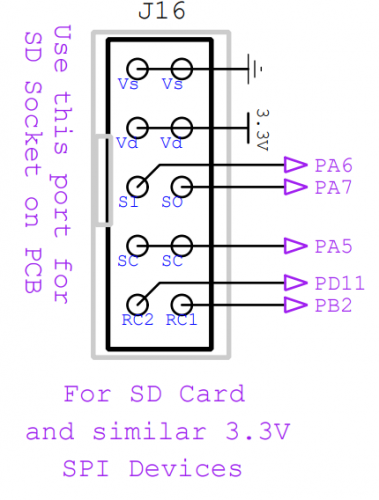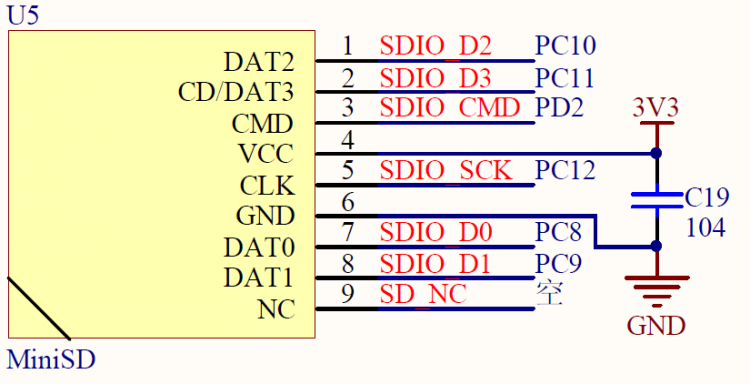
zaordsword
-
Posts
44 -
Joined
-
Last visited
Content Type
Profiles
Forums
Blogs
Gallery
Posts posted by zaordsword
-
-
Hi here,
I tried to make working a PIC18LF452 with MIOS with 3.3 V power supply since those version are supposed to be low voltages, but below 4.4 V the mios studio doesn't detect anymore the board.
Does anyone have an idea why ? -
Hi !
There is boards used in micropython like the pyboard. It use a Stm32F405GT6 (see here : https://micropython.org/resources/PYBv11-schematics.pdf)
Do you think it could be possible to flash DIPcoref4 version of mios over those boards ? -
Hi !
I wonder if it is possible to remplace the AINSER64 port by a second DIN porte for having 8 SR on one port and 8 SR of a second port.
Thanks a lot by advance !Ewen
-
Hi here,
I wonder how it is possible to change the size of the police with glc type SSD1306.
Thanks by advance for your replies ! -
Bonjour,
Je cherche une solution pour pouvoir faire envoyer plusieurs noteOn pour créer un accord a 3,4 ou 5 sons (en fonction de la table excell .MIO) lors de l'appui sur un bouton d'un DIN module d'un midibox STMf4 avec l'appli midio128 (https://github.com/midibox/mios32/tree/master/apps/controllers/midio128_v3/src).
Je pense qu'il y a un peu de code à réécrire dans l'application MIDIO. Quelqu'un pourrais m'aider ?
Voila l'idée: Dans une ligne du fichier patch :
#DIN;SR.Pin;USB1;USB2;USB3;USB4;OUT1;OUT2;OUT3;OUT4;RES1;RES2;RES3;RES4;OSC1;OSC2;OSC3;OSC4;Mode;OnEv0;OnEv1;OnEv2;OffEv0;OffEv1;OffEv2
DIN;12.D3;1;0;0;0;1;0;0;0;0;0;0;0;1;0;0;0;0;0x90;0x30;0x7F;0x90;0x30;0x00Je voudrais pouvoir rajouter dans les Notes OnEv0,OnEv1 et OnEv2 plusieurs messages midi qui correspondraient a les différentes notes de mon accord et modifier le code de l'application pour qu'elle detecte le nombre de messages midi (séparé par exemple par des espaces) et que le contrôleur envoie 3 messages si il trouve par exemple 0x90 0x90 0x90;0x30 0x32 0x35;0x7F 0x7F 0x7F;0x90 0x90 0x90;0x30 0x32 0x35;0x00 0x00 0x00
Merci d'avance pour votre aider pour cette problématique !
-
Bonjour à tous,
Je cherches une solution pour pouvoir faire varier la vélocité de chaque note d'un DIN module d'un midibox STMf4 avec l'appli midio128 a l'aide d'un capteur de pression de type BMP280, assez largement utilisé avec arduino pour midifier des accordéons par exemple.
Ca fait des mois que je galère. On trouve déja les drivers de ce capteur interfacé en i2c ou en spi pour arduino, et j'aurais besoin d'aide pour pouvoir coder ca dans l'application midio128.Je vous joints les deux drivers qui sont codées en C pour arduino et un driver codé en python que j'ai testé également.
Merci d'avance pour votre aide à tous :)
-
Hi,
Is it possible to define a Input putton to play a chord, like from DIN module and STMF4 the D1.1 send 3 midi messages simulteanously for exemple C2 E2 G2 ?This is for midify an left side of an accordion.
Thanks by advance
-
I have connected an analog voltage to J5A and I am still trying to understand how can I turn this into a velocity modification applied to every notes On events ...
It is that this difficult ?
-
On 2/17/2021 at 6:52 PM, latigid on said:
Maybe it would be easier for you to use the Arduino and output an analogue voltage to be read by the STM32F4 AIN? That way you can use your working system without much extra coding effort. MBIO supports AIN either on the MCU ports J5A/B or using the AINSER module (typically less noise on the signal).
Do you have any idea to do that, I have worked a lot on it but still I don't know how to do that.
Thanks by advance for your helps
-
For SPI I have this question :
1) Should I create a special new file for my driver (for exemple bmp380.c ), or should I modify another file existing file in the MIDO128 project and add my code into ?
2) In which file should I need to declare my new SPi driver ? I had a look in MIOS-32spi.c /.h and it seems the declaration is on this file but I am not sure
3) Is there a IDE specially adapted for coding MIOS ? Eclispe ? Borland ? something even better ?
QuoteThere is some module board which convert SPI to Analog, that could be a easy solution.
So 2 maybe more "easy" questions :
1 ) How can I calibrate my Ain threshold on MIDIO to say for exemple that a +0.4V correspon to 0 velocity and 4.5 correspond to 127 in velocity ?
2) How can I set that this realtime velocity given by the AInput is applied to all the MIDI event from the DIN module ?
Thanks a lot, I really hope that I could fond a solution
-
Hi,
On 2/13/2021 at 8:41 AM, latigid on said:Maybe you can try to code a driver for a similar sensor with an SPI interface?
The bmp280 is also working with SPI interface !
Do you think it could be more easy do use this kind of interface ?
Do you have exemple of coded drivers working with SPI interface working with MIOS32 that could be closer than wroting a driver in I2C interface ?
Thanks by advance ! -
Hi latigid !
Thanks for your answear :)>>have you written a driver for it to be used with MIOS?
No, I don't know how to wrote the driver working with MIOS, but I have a script for making it working with arduino and python.
Do you have examples of drivers ? I have see nothing about this topic anywhere on ucapp or on wiki or documentation and forum ...
The bmp280 is a pressure / temperature and humidity sensor manufactured by boch. I join the datasheet, my python and a arduino script. (c ++)Edit: I had upload server -200 error when I try to up the datasheet . It's a project exemple availble here. The datasheet is on le page or datasheet
>>How would you expect the velocity values to be modified?
The sensor give the barometric pressure . I plan to save the atmospheric pressure at initialization as P0 and find the realtime surpressure like P_surpess= ( Press_sensor(t) - P0)Then I would like to map a certain variation of pressure matching with the velocity from 0 ... 127
>>Have you looked into the MBIO code?
What is MBIO code ? If you talk about the code on github there is a lot of file and I don't know where to find the file where to modify or to put a driver.
I did not find documentation of a list of the reference classes / function. -
Hi here !
I am trying to modify the velocity of all notes of a DIn module within the MIDI128 program with a I2c sensor pressure meter type BMP280.
Do you have any idea for how to make that ? I am using the MIDIo128 program !
Thanks !
-
Hi here,
Anyone can help me ? Any one have any idea ?
Thanks by advance :) -
Hi I finally decided to have digital input for keyboard. I try now to modify the velocity of all notes from the DIN module with a I2c analog sensor.
Do you know how can I do this ?
-
Hi here !
I am trying to modify the velocity of all notes of a DIn module with MIDI128 with a I2c sensor pressure meter type BMP280.
Do you have any idea for how to make that ? I am using the MIDIo128 program !
Thanks !
-
Okay, And for shifting SD card to J16, J8/9 or J19, how can I do that ?
-
Hi !
Where I can remap those pins ? in which file ?
It is for a MIDI128 application
-
Hi here,
I try to modify the pin definition mapping between MIOS and hardware because I use a STM32F4VGT alternative board with a sd card directly implemented and the pins are differents for the midibox standard pins.
I need to swap this standart Midibox Ports to this new ones :
Midi box | Alternatie board
To :
How can I do that ?
Thanks a lot by advance !
-
What was you problem ?
I can't make mine working :) -
Anyone could help ? I don't find any .ngc parameter file
-
Hi Here !
Is it possible to use Oled displays SSD1306 with midi 128 ?
There is no information about it here : http://www.midibox.org/dokuwiki/doku.php?id=oled I wonder if I need to change something in the code.
Best Regards
-
How can I know which reference I should use to replace it ?
How ca I know where is the cristal on the board ?Thanks a lot Antichambre ;)
-
Thanks,
Is it possible to modify anything on the code to get this board working with MIOS32 ? I just need MIDIO128, maybe that could help..
Thanks by advance !



Is is possible to Use two DIN module on a midicore STM32F407 ?
in Testing/Troubleshooting
Posted
Thanks Andy !
Good idea, thats worked